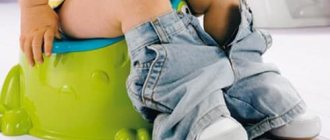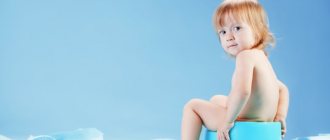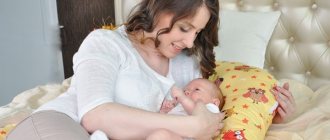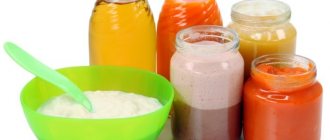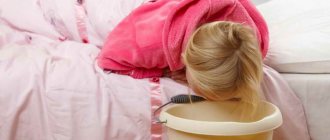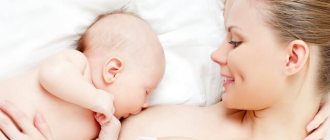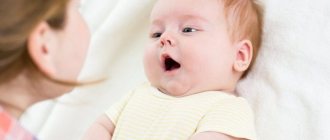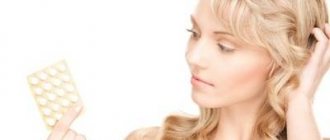Every mother is concerned about the well-being of her child. The state of health can be judged by many factors, one of which is stool. The regularity of bowel cleansing and the quality of stool certainly depend on nutrition, general development, and physical activity. But other things can also affect the digestion process, such as certain diseases. Today you will learn what to do if a child (2.5 years old) has loose stools. The action taken depends on what is causing the condition.
Loose stools in a 2 year old child
Stools that are repeated more than three times a day can be called diarrhea. This condition is familiar to every person. The causes of diarrhea can be very different:
- infectious and inflammatory processes in the intestines;
- taking certain foods that cause fermentation and thin stool;
- use of medications;
- psychological reasons and so on.
Diarrhea is usually caused by one of two factors:
- most often, diarrhea is caused by increased intestinal motility, as a result of which the food you take is quickly evacuated;
- less often, stool becomes more frequent due to the entry of large amounts of water into the large intestine.
Loose stools in a 2-year-old child often have additional symptoms. Using them, you can determine the cause of the ailment, and then correct it. Remember that diarrhea can be quite dangerous for a baby. Therefore, first of all, it is necessary to show the little patient to the doctor. It is permissible to give any medications only as prescribed by a doctor. Let us consider in more detail what can cause loose stools in a 2-year-old child.
Infectious diseases: rotavirus or intestinal flu
Viral loose stools in a 2-year-old child begin suddenly. It is often accompanied by vomiting (single or frequent). The temperature may remain within normal values or rise, but usually the thermometer level does not exceed 39 degrees. Rotavirus infection, also called intestinal flu, is highly contagious. Therefore, outbreaks of the disease occur in small epidemics. Usually, within a few weeks, everyone who surrounded the infected child becomes ill. In adults, the symptoms of pathology can be blurred and almost unnoticeable. With viral diarrhea, a large amount of salts are lost along with water. Protein is practically not lost. Diarrhea lasts from 3 days to a week, after which recovery occurs.
Poisoning
If a child is 2 years old and has loose stools without fever some time after eating, this may be a sign of poisoning. Pay attention to what the baby ate shortly before his health deteriorated. In case of poisoning, you can often find pieces of undigested food in the stool. Vomiting may or may not be present. The child in this situation complains of abdominal pain. You can hear fermentation and gurgling. A distinctive feature is the fetid odor of feces.
In case of poisoning, severe intoxication occurs. The child's condition may become severe due to dehydration. If you see that your baby is getting worse, call an ambulance immediately. Often, the use of incompatible products results in mild poisoning.
Recommendations for parents
If the occurrence of morning diarrhea is associated with overeating or eating a huge amount of sweet foods, then parents should make adjustments to the child’s daily menu. In addition, caution should be exercised in giving a child food that raises doubts among parents. Poor quality food can cause food poisoning. This means you need to pay attention to the expiration date when buying products in the store. This rule also applies to food prepared at home.
It should be remembered that each specific case of loose stools in the morning must be considered individually. This is due to the fact that the reasons that provoke the occurrence of such a symptom can be very diverse, ranging from problems with the child’s physiology and ending with his psychological state.
To prevent negative consequences, parents should pay special attention to the health of the baby and seek medical help when the “first signs” occur.
Taking antibiotics
If the child is 2 years old, loose stools with mucus may result from drug treatment. This condition is often provoked by antibacterial drugs. Remember if you gave these to your baby the day before. It often happens that a child has a disease, for example, bronchitis or tonsillitis. The doctor prescribes an antibiotic, after which diarrhea begins within a few days. This is a completely normal reaction. The fact is that drugs with a wide spectrum of action destroy not only pathogenic flora, they kill beneficial microorganisms. Because of this, digestive failure occurs, accompanied by fermentation, bloating and loose stools.
It is highly likely that the doctor will not cancel your antibiotic therapy, but it is still worth informing the doctor about such a reaction to treatment.
Methods for treating diarrhea in children
If a child 2 years old has diarrhea, treatment should be selected by a doctor. The cause is identified by interviewing and examining the patient, ultrasound of the abdominal organs, coprogram, and blood tests. If the cause of diarrhea is dysbacteriosis, then dairy products should be included in the menu. Medicines require lacto and bifidobacteria, enzymes - Mezim, Creon, Festal.
When the reason is individual intolerance to a product, it is enough to exclude it from the diet, give the child a sorbent and give him plenty to drink. If an allergic reaction is pronounced, then taking antihistamines, for example, Erius, Loratadine, Fenistil, is indicated.
In case of bacterial damage, antibiotics, sorbents and drugs are required to restore the microflora.
Are antibiotics needed?
Treatment with antibacterial drugs is resorted to only in the presence of pathogenic bacteria. You cannot give your child antibiotics without test results. They destroy the intestinal microflora and provoke dysbacteriosis. This can further aggravate the baby’s condition and lead to serious complications, so such therapy is only a last resort when it cannot be avoided.
Typically, children 2 years old are recommended to take a suspension from the nitrofuran group. Nifuroxazide, having an antibacterial effect, is not an antibiotic in nature, since it has a local effect. It fights only harmful bacteria without destroying beneficial microflora.
In severe cases, broad-spectrum injectable drugs may be administered.
Basic therapy methods
To quickly stabilize your baby’s condition you need to:
- Identify the cause of diarrhea.
- Organize proper nutrition for the child with the advantage of liquid foods that are gentle on the gastrointestinal tract. Portions should be small; if a child refuses to eat, there is no need to force him. In this state, it is better to eat a few spoons than to empty the entire plate and cause a gag reflex or stomach stoppage.
- Use sorbents to get rid of toxins. Atoxil and activated carbon are suitable.
- Give the baby a drink with herbal decoctions, compotes, fruit drinks, purified water, and weak tea. This will prevent the development of dehydration and serious consequences of the condition. To normalize the water-salt balance, pharmaceutical preparations Regidron, Electrolyte, Oralit help well.
- Monitor hygiene, cleanliness of clothes and bed linen.
You cannot treat a child with home methods if blood and other impurities appear in the stool. If the color of the stool changes to white, green, black or purple, parents are confused and do not know what to do. In this case, the best help for the baby will be urgent hospitalization. The condition may indicate pathologies of internal organs, for example, blockage of the biliary tract, internal bleeding, bacterial damage to the intestines.
Individual characteristics
Yellow loose stools in a 2-year-old child may appear due to psycho-emotional stress. Young children are very susceptible to stressful situations. They can react this way to severe fright, excitement, or prolonged fear. In this case, the increased urge to defecate is not accompanied by additional symptoms; attacks occur periodically.
Digestive disorders in children are often due to lactase deficiency. If this diagnosis is made to a child, then it is necessary to refrain from consuming dairy products, which cause bloating and diarrhea. It is also possible to correct this condition with the help of medications containing the missing enzyme.
Alimentary diarrhea in children appears due to prolonged malnutrition, an imbalance in the level of proteins, fats and carbohydrates, and insufficient functioning of the liver, stomach or pancreas. In this case, green liquid stool is observed in a child (2 years old).
Causes of morning diarrhea
If diarrhea occurs every day in an adult for a long period, it is difficult to determine the cause of the ailment. You may need the help of a gastroenterologist. The doctor will order an examination of the gastrointestinal tract to make a diagnosis. Morning diarrhea often occurs due to:
- Pathologies of the gastrointestinal tract: ulcers, gastritis, malignant tumors, colitis.
- Food poisoning, disruption of the gastrointestinal tract associated with the ingress of bacteria.
- Poor nutrition.
- Reaction to drugs.
- Emotional, nervous overstrain.
Unstable functioning of the stomach and intestines is a common cause of morning discomfort.
Diarrhea may occur due to eating expired foods. In this case, it will not last long. If an adult drinks even a small amount of alcohol every evening, diarrhea may occur the next morning.
Stools may become liquid due to the body’s reaction to coffee, milk, or raw vegetables.
Neoplasms can provoke disruption of intestinal function in the morning. Diarrhea with cancer is regular if the lesion is in the rectum.
Frequent consumption of chocolate and carbonated drinks provokes diarrhea in the morning.
Pathologies in the functioning of the gallbladder, gallstones limit the release of bile acids into the digestive tract, which disrupts digestion and causes intestinal upset.
Disorder in children
Daily diarrhea in a child can occur for harmless reasons. In infants, diarrhea in the morning may occur due to complementary foods introduced into the diet. In older children, the disorder occurs due to the abuse of sweets before bed.
Like an adult, a baby’s diarrhea occurs due to poisoning or an intestinal infection.
Food allergies can cause loose stools immediately after breakfast.
Factors that provoke diarrhea in the morning
A person suffering from chronic diseases of the abdominal organs does not always suffer from diarrhea. This symptom may be completely unfamiliar to the patient.
The cause of diarrhea can be one. But the factors that provoke it are different. The following may contribute to the appearance of symptoms:
- The habit of quickly eating food without chewing.
- Frequent drinking of alcohol in the evening.
- Use of medications, laxatives in large dosages.
- Morning sickness in early pregnancy.
The goal of treatment is to normalize electrolyte balance
Whatever causes indigestion, the main task is to replenish the lack of fluid. For this, the child is advised to drink plenty of fluids. If there is no vomiting, and diarrhea is of non-infectious origin, then you can get by with clean water. If salts and other important elements are lost, it is necessary to use special solutions: “Regidron”, “Glucosan”, “Citroglucosan” and others.
Give your baby a small sip every 2-5 minutes. Do not overdo it so as not to provoke vomiting. It is preferable to use solutions at the same temperature as the baby’s body. In this case, the substances will be absorbed most quickly.
Adjust your diet
For indigestion of various types, it is recommended to exclude all dairy products. This environment is the most favorable for the proliferation of pathogenic microorganisms. Giving your child milk and kefir for diarrhea will only worsen his well-being.
Put the little patient on a specific diet. Give your baby rice water, jelly-like soups, light porridge with water. Completely eliminate raw fruits and vegetables, carbonated drinks and sweets. As soon as the child gets better, gradually introduce boiled lean meat and eggs. For each of the listed diseases, an individual diet is prescribed. Be sure to discuss it with your doctor.
How and what to feed your baby
If you have diarrhea, following a diet is important. The main point is the restoration of the lost water-salt balance, but nutrition also plays an important role.
In the first days of the disease, it is necessary to feed the baby about 6 times a day in small portions, but you should not do this forcibly. If the child’s condition is serious, then the size of the portions should be reduced by half, as well as the number of feedings, and meals should be fractional. Gradually (over a week) portions should be increased to normal volume.
The menu of a sick child should include vegetable soups with a mucous structure, cooked with the addition of cereals (buckwheat, rice or oatmeal), as well as liquid boiled non-dairy porridge. Jelly and compotes made from berries, especially blueberries, will be very useful.
From the very beginning of the disease, it is necessary to include fresh fermented milk products with bifidobacteria in the baby’s diet. Their fat content should not exceed 2.5%. On the second day of diarrhea, the child can be given crackers, and on the third day, low-fat cottage cheese and banana puree.
Baked apples are useful in this condition, since they contain substances that help the rapid restoration of mucous membranes, as well as normalize the intestinal microflora. Raw apples (mashed into puree) can be given only from 3-4 days. During the same period, you can include in the menu a steamed omelet, meat purees from lean chicken, turkey or veal, as well as steamed meatballs, cutlets or meatballs.
It is important to completely exclude fresh fruits and vegetables, milk, mushrooms, juices, fermented baked milk, cream, legumes, confectionery, rye bread and baked goods, as well as carbonated drinks from the baby’s diet.
Sugar consumption should also be limited. You should not give fried, pickled or smoked foods, or prepare soups with strong meat or vegetable broths. It is also important to observe the temperature regime of food: dishes should be warm, since hot or cold foods will further irritate the mucous membrane.
After the diarrhea stops, the diet must be followed for about 2 more weeks, but the doctor will tell you the exact period based on the cause of the disease and the severity of its course.
Author: Vaganova Irina Stanislavovna, doctor
A 2-year-old child with loose stools: how to treat?
Many parents ask this question, because they want to help their little patient. Drugs such as Imodium and Loperamide are excellent at stopping diarrhea, but they should not be given to children under 6 years of age. Remember this important rule. You can help your baby with the following medications:
- enterosorbents “Smecta”, “Enterosgel”, “Polysorrb” will remove toxins, allergens, poisons and toxic substances from the child’s body (can be given without a doctor);
- calcium gluconate will have an anti-inflammatory and antioxidant effect (it can be used independently in the absence of contraindications);
- antispasmodics “Drotaverine”, “No-Shpa”, “Papaverine” will relieve abdominal pain (only after diagnosis);
- carminatives “Espumizan”, “Bobotik” will reduce gas formation and relieve discomfort (can be used without prescription);
- antipyretics "Ibuprofen", "Panadol" will eliminate fever and malaise (only at high temperatures or after diagnosis).
Sometimes doctors prescribe additional enzymes that normalize digestion (Lactazar, Creon), and also prescribe probiotics (Linex, Maxilak), which will restore the natural intestinal microflora.
Summarize
If your baby starts having diarrhea, and then the temperature rises or additional symptoms of illness appear, then don’t guess with coffee grounds. See your doctor as soon as possible. Prolonged diarrhea accompanied by vomiting can lead to dehydration. This condition occurs especially often in children. It is dangerous because the kidneys and cardiovascular system suffer, acetone appears in the urine, and severe intoxication occurs. With timely diagnosis and proper treatment, the body recovers within two weeks. Discuss with your pediatrician the possible causes of baby loose stools, and be on the lookout.
Treatment options
Morning diarrhea is a symptom of many diseases, therefore, in the choice of medical tactics, the main role is played by the identification and treatment of the underlying pathology.
Now there is a huge selection of drugs that help fight intestinal disorders. In addition to this, proper nutrition and the use of folk remedies are added.
How to get rid of diarrhea at home - the next article will tell you about this.
Diet
Foods you can eat for diarrhea:
- lean meat, skinless poultry;
- wheat bread crackers;
- unleavened cottage cheese;
- steam cutlets;
- minced meat with boiled rice;
- lean types of fish;
- pureed porridge cooked in water or broth;
- scrambled eggs;
- jelly and jelly;
- apples;
- green tea.
Foods that should not be eaten:
- fatty broths;
- soups with pasta, cereals;
- fatty meats;
- sausages and smoked meats;
- fatty and salted fish;
- canned food;
- legumes;
- pasta;
- barley groats;
- fried eggs;
- sauces, spices;
- fruits and berries in their natural form;
- honey;
- sweet.
Taking medications
For diarrhea, the following groups of drugs are prescribed:
- Probiotics are used to relieve symptoms of dysbiosis, one of which is diarrhea. Restores the balance of microorganisms, which leads to normalization of stool. This group includes:
- Linex - capsules for normalizing intestinal microflora, price - 400 rubles;
- Bifidumbacterin - powder in foil bags, normalizes the activity of the gastrointestinal tract, price - from 80 rubles;
- Bifikol - ampoules or bottles, 3 doses each, antimicrobial drug, price - from 200 rubles;
- Hilak Forte - drops in bottles of 30 or 100 ml, accelerates the absorption of food, does not allow pathogenic flora to spread, price - from 200 rubles.
- Drugs to slow down peristalsis:
- Imodium – capsules, blocks opioid receptors, price – from 250 rubles;
- Loperamide - tablets that dissolve in water, reduce intestinal motility, price - from 25 rubles;
- Enterobene - tablets for diarrhea, price - from 180 rubles.
- Antibiotics:
- Levomycetin – tablets, powder, price – from 76 rubles;
- Amoxicillin – tablets, powder, price – from 27 rubles;
- Metronidazole - tablets, solution for infusion, has antimicrobial and antiprotozoal effects, price - from 40 rubles.
- Enterosorbents:
- Activated carbon - tablets, powder, the most effective remedy for diarrhea, which absorbs toxins, price - from 10 rubles;
- Smecta is a powder for preparing a suspension, a drug with an adsorbing effect, price – from 130 rubles.
A review of inexpensive but effective anti-diarrhea tablets can be found here.
Traditional methods
Prolonged diarrhea in the morning requires medical attention, but in the first days you can try to cope with the disease yourself, using folk remedies for diarrhea. Herbal treatment relieves inflammation and soothes irritated bowels.
